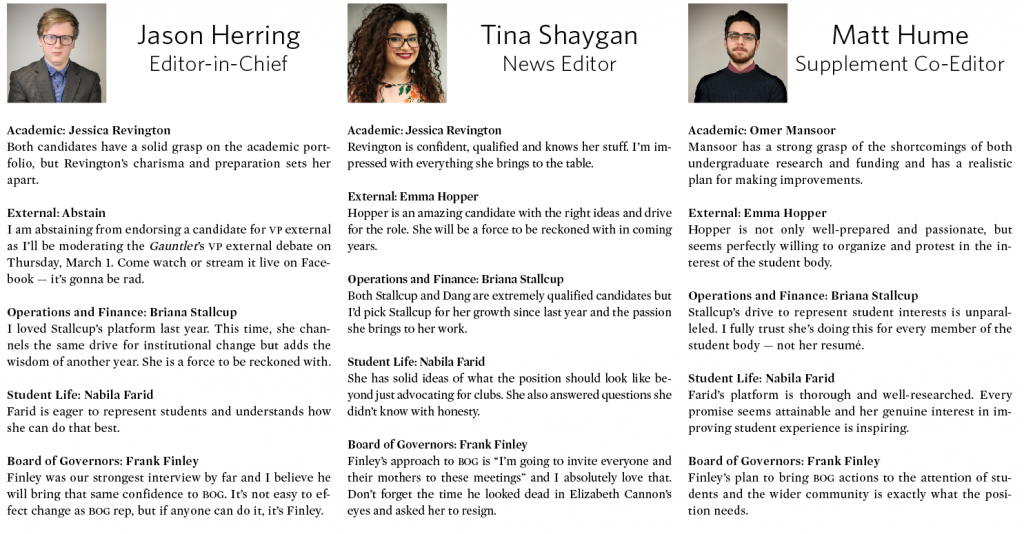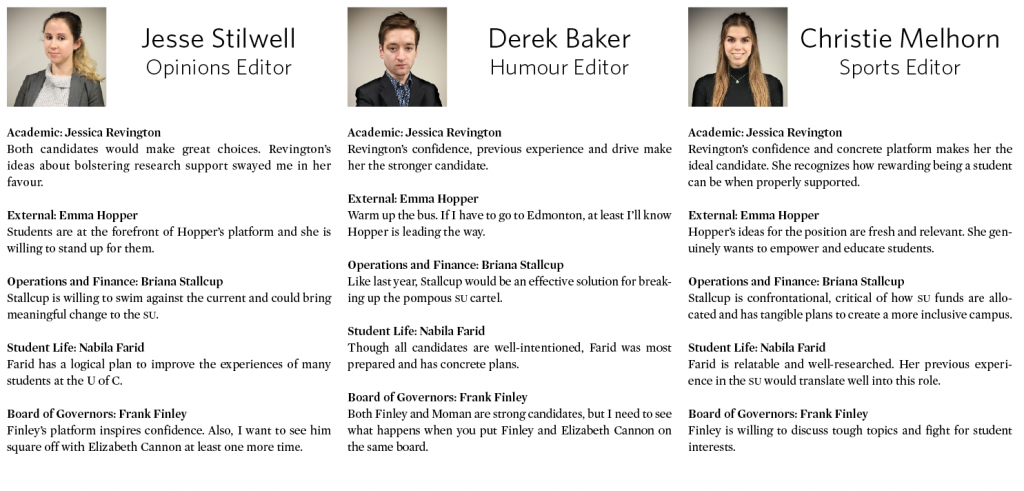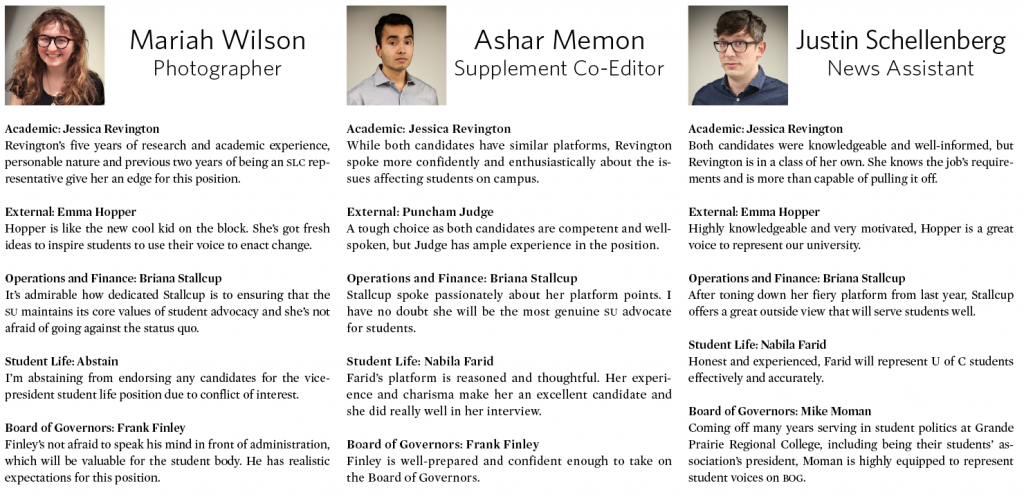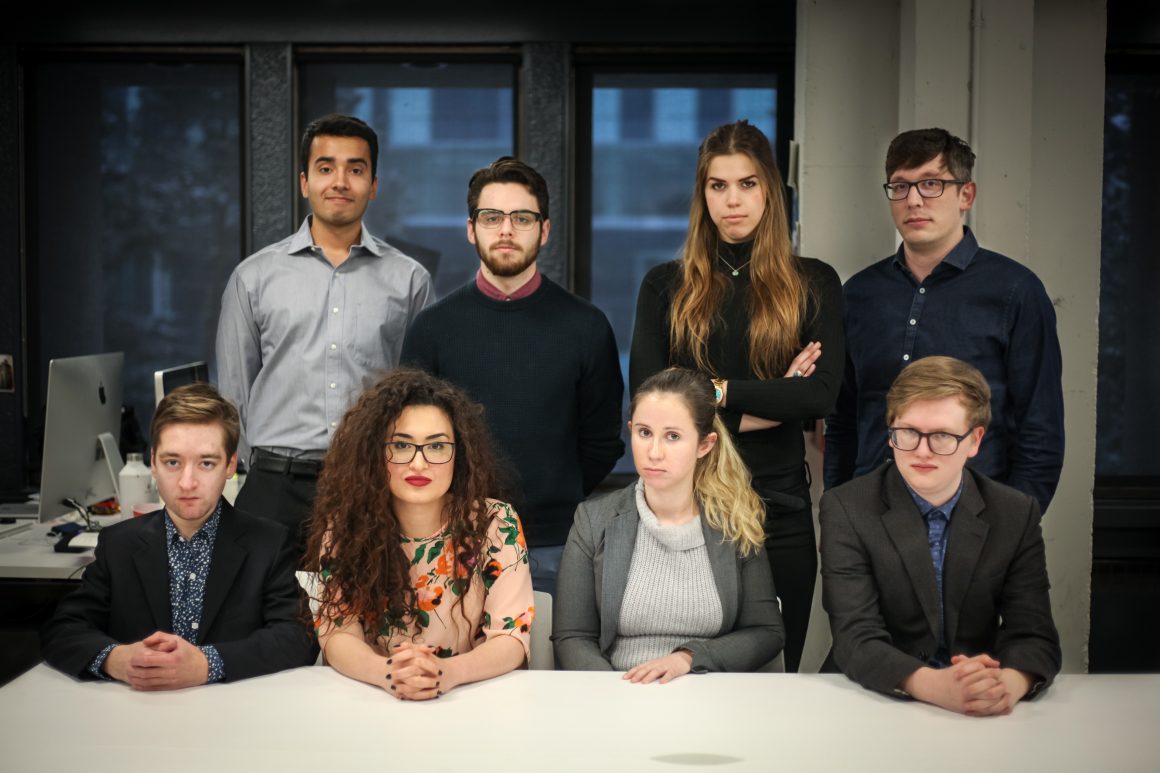
2018 Students’ Union Election Supplement
Panelists
President — External — Operations & Finance — Student Life — Academic — Board of Governors
Endorsements
It’s the most wonderful time of the year. The Students’ Union election is right around the corner and every year the Gauntlet puts together the fine SU election supplement that you’re holding in your hands right now. The supplement is made to inform students of who is running, what they hope to do if they’re elected and who we think is most likely to actually accomplish their goals.
We cleaned up the office, put on some clean shirts and invited all candidates with eyes on executive positions to make their case for this year’s election. After a five-minute platform pitch and a 10-minute question-and-answer session with a panel of Gauntlet staff, we put together these snack-sized profiles to help inform students on the election candidates.
It will be an interesting year for all incoming SU representatives. In early 2018, a long-awaited resolution to the MacHall ownership dispute was put forward, with the SU to take management and the University of Calgary to take ownership of the building on May 1. The need for a strong student government that’s ready to represent students’ interests on the Joint Liaison Committee — the committee that will be responsible for any future developments in MacHall — is more necessary than ever. In addition, Elizabeth Cannon has announced her resignation and will be on her way out on
Dec. 31. This rare combination offers the potential to set a new status quo for relations between the SU and administration.
We’re well aware that election time isn’t a joy for everyone. It’s impossible to walk to class without getting every meme-riddled election poster seared into the deepest parts of your brain and you’re probably not paying attention to every classroom pitch ahead of your morning lectures. While it can be annoying, SU elections have a significant impact on all U of C students whether you’re here for several more years or not. Electing competent officials to represent the student body deserves at least a day’s worth of attention every year.
Once you’ve read the Gauntlet candidate profiles, check out our endorsements and take the time to review every candidates’ platforms for yourself. We’re happy to help present you with as much information as we can but the choice will always be yours. Every platform is available on the SU website and every candidate is available during the campaign period to answer your questions themselves, so don’t hesitate to ask them anything.
So what next? Well, park yourself down and give this a read, then make sure you vote from March 6–8. You can vote online through your student centre or in-person via ballot boxes across campus.
Panelists
President
[hr gap=”15″]
The president is the leader of the Students’ Union. They have the most flexible portfolio, but are generally in charge of setting the direction of the organization. They also maintain official relations with the university, oversee the work of Students’ Legislative Council and vote on the Board of Governors. Look for an assured, pragmatic candidate who is aware of the challenges facing the SU.
Sagar Grewal – Acclaimed President
University of Calgary students should breathe a sigh of relief that if anyone is going to be acclaimed as president, it’s Sagar Grewal. The current kinesiology representative is well-prepared to competently and thoughtfully lead the organization next year.
As kinesiology representative, Grewal has shown that he is able to deliver meaningful accomplishments for students. In his first term as a faculty representative, he secured $450,000 in funding for study space renovations in the kinesiology complex and was named elected official of the year. His projects this year include launching a survey in his faculty for scholarships and creating gender-neutral change rooms in the Kinesiology complex.
![“[The SU] is meant to be a collective of what the student voice is and to truly live up to the words of serve and represent to the best of that ability.”](https://www.thegauntlet.ca/wp-content/uploads/2018/02/PRES_SagarGrewal_MariahWilson--200x300.jpg)
“[The SU] is meant to be a collective of what the student voice is and to truly live up to the words of serve and represent to the best of that ability.”
Grewal’s platform points are safe and predictable. Firstly, with the conclusion of the MacHall dispute, Grewal believes the next steps for the SU’s involvement in the building are redevelopment. He wants to launch a new consultation for the building’s needs, as the last one was conducted in 2012. His goal with the building is to approach the issue of student space so students want to stay on campus after their classes are done, a solid approach that he’ll represent to the administration. Secondly, the SU president will be on the selection committee for the U of C’s new president following the resignation of Elizabeth Cannon. Grewal wants to ensure that the commitment to the student experience is a top priority for Cannon’s successor.
A key part of his platform is the revival of SU town halls at the beginning of the academic year. SU-hosted town halls have been noticeably absent for almost a decade and by reintroducing them, Grewal wants the event to allow executives to showcase their portfolios and present the SU’s annual plan. Though it may only be attended by the “hyper-engaged” — who probably know already what’s planned for the upcoming year — it’s a commendable effort to increase student engagement with the SU. This commitment to greater student involvement is also present in his plan to change membership in the Presidential Consultative Task Force from stakeholders of particular groups on campus to just students-at-large.
When asked what makes him best for the position, Grewal jokingly responded with “I applied.” He considered including reforming acclamations into a yes/no vote in his platform, saying that he’d “be more than happy” with a yes/no vote. Though we’re upset that we won’t be seeing his rumoured Drake-themed campaign this election season, we’re optimistic to see Grewal running through MacHall with his woes as SU president next year.
Selected Qualifications:
• SU kinesiology representative, 2017
• Recipient of the Students’ Legislative Council award
Students Association
Check out our interview with Sagar Grewal: New SU president-elect talks acclamation and his would-be Drake campaign.
External
[hr gap=”15″]
The vice-president external is the Students’ Union’s representative to municipal, provincial and federal governments. They are also the primary delegate for the many umbrella lobbying organizations the SU takes part in. Vote for the candidate you think can hold their own in a meeting with cabinet ministers or city councillors.
Emma Hopper
With a logical, comprehensive and refreshing platform, Emma Hopper is a great choice for VP external. Her desire to advocate for students was evident in both her platform and interview, which she delivers confidently and succinctly.
Each of Hopper’s points tie back to University of Calgary students. There are also multiple avenues to include students in her work and advocacy embedded in her platform, as she said making the VP external a prominent figure both on and off campus is important to her.

“I know what can be accomplished when students come together and fight for what is right.”
Hopper plans to advocate to expand the VP external’s budget — the smallest of all SU executives — to accomplish her goals, like offering five-session lobbying workshops to give students the knowledge and tools needed to understand and engage with the government. Her plans around “get-out-the-vote” campaigns for the provincial and federal elections in 2019 include advocating for increased funding for the Post Secondary Students Support Program, a federal program that provides financial support to Indigenous students.
She also included platform points similar to the priorities of the Council of Alberta University Students and Canadian Alliance of Student Associations. This includes lobbying the provincial government to regulate tuition by tying it to the Consumer Price Index and advocating for a “student-friendly” copyright policy, which the federal government is currently in the process of amending. She wants this policy to maintain education exemptions from copyright rules, which enables professors to share literature with their students at no cost.
Most notably, Hopper is willing to budget and plan to mobilize students for protests if the government doesn’t address students’ needs. She established that she is not afraid to face resistance on some of her ideas and that fighting for what students believe is necessary.
Hopper argues that her experience advocating for people with disabilities and extensive club experience makes her qualified for the position. She plans to have open communication channels to keep students informed on what she is working towards, but it’s questionable how much support a monthly vlog would get from unengaged students. Regardless, Hopper is an excellent candidate for VP external.
Selected Qualifications:
• Vice-president internal, University of Calgary Debate Society
• Director of strategic planning, Faculty of Arts Students Association
• SLC deputy speaker
Puncham Judge
After stepping into the vice-president external role midway through last November, Puncham Judge brings forward a largely conventional list of advocacy priorities for the coming year.
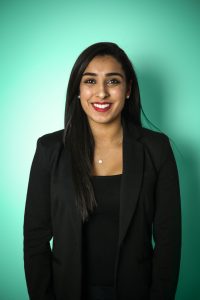
“I know what the role entails and what is expected of me.”
Judge’s platform places the greatest emphasis provincially, both where an election will happen earlier and where most decisions pertaining to post-secondaries are made. Her biggest platform point addresses the tuition freeze, which the provincial government recently extended through to 2018–19. Judge rightly calls the freeze a “band-aid solution” and says advocating to legislate tuition by rolling it back to 1992 rates and tying it to the Consumer Price Index will give students affordable and predictable tuition.
Tuition at 1992 rates is a tantalizing idea and one that seems possible with the province’s current New Democratic Party government, who might try to swing for the fences for the student vote before the 2019 election. However, the platform point is directly adapted from the Council of Alberta University Students’ 2017–18 priorities list, which is reflective of much of Judge’s platform. While staying consistent with advocacy points she’s currently undertaking is important, Judge doesn’t present any original ideas.
Provincially, Judge is also focusing on the expansion of the Student Temporary Employment Program and elimination of market modifiers.
When Judge was appointed as VP external last semester, she was upfront about her intentions to run for the position this term. Now, she’s honest about difficulties she had during her time in the position with minutiae, which she attributes to not having a full transition period into the
position.
However, much of Judge’s argument for her own re-election is the experience granted by her status as an incumbent. But she considers her greatest accomplishments during her term to be action on secondary suites, which was mostly sparked by new council members elected before she took office, and the tuition freeze, a development she is devoting extensive time to finding a long-term alternative for.
Judge could be a dependable VP external. Though she currently lacks confidence with in-depth policy discussions, she’s someone students should feel comfortable representing them to decision makers.
Selected Qualifications:
• SU arts representative, 2017
• SU vice-president external, 2017–18
• Internship at the World Federation of United Nations Associations, February 2018
Operations and Finance
[hr gap=”15″]
The vice-president operations and finance is responsible for the Students’ Union’s budget, SU policy and the fiscal operation of their businesses in MacHall. They also chair several SU committees.
Kevin Dang
Kevin Dang’s experience as a science representative and his thorough understanding of the vice-president operations and finance role make him a good choice for the position. However, while his platform is mostly feasible, it lacks imagination and originality.

“A few of my strengths come from being able to deliver on my platform and being able to get things done.”
Dang heavily emphasizes the need for student consultation. One of his major focuses is on increasing student consultation for redeveloping MacHall spaces and programs. To do so, Dang proposed using tenant revenue and working with newly formed committees from the recent MacHall agreement with the university, showing that he is familiar with the current responsibilities of the position.
Dang’s most intriguing platform point aims to create new programs to address issues of food waste and food insecurity on campus. However, Dang didn’t clarify what potential pilot programs would look like and how they would differ from existing services, like the SU Campus Food Bank.
Continuing in the footsteps of current vice-president operations and finance Ryan Wallace, Dang said that he wants to look into ensuring that current SU services, like the Health and Dental plan, are sustainable both for students and the SU. He also said that he wants to continue work on the Cannabis Working Group to make sure weed legislation is handled carefully on campus. His past experience consulting with Wallace and serving on the operations and finance committee will likely be useful in this capacity. However, simply pledging to “continue to work” on the services is an easy platform point that should be a necessary requirement for whoever takes the job next year.
Dang also wants to increase engagement with the SU by ensuring that student-at-large positions are more accessible for all students. This could benefit those looking to get more involved on campus. Dang’s proposal to create a centralized application and standardized training for successful applicants — while daunting — could pay off if implemented properly.
Dang is well-versed in the responsibilities that fall under the vice-president operations and finance portfolio. He articulated his thoughts clearly and was confident in delivering a promising platform that would maintain the status-quo and continue to benefit students. Overall, Dang would keep the ship afloat, making him a safe choice for the position.
Selected Qualifications:
• SU science representative, 2017–18
• Member of the SU Operations and Finance Committee, 2017–2018
• The Science Undergraduate Symposium task force chair and project lead, 2017–18
Briana Stallcup
You may remember Briana Stallcup’s unabashedly anti-establishment campaign from last year. This time, the same drive for institutional accountability and a truly student-focused union is bolstered by a year’s worth of reflection.

“I’m not doing this for a seat at the throne. I’m doing this because I care. I’m doing it because I feel like I’ve been wronged by the SU.”
In all her platform points, Stallcup is committed to refocusing the SU back on students. She appears firm in her stance to never support any financial increase for students. She also recognizes the significant opportunity to advocate for student interests in the newly formed Joint Liaison Committee (JLC), which will be the governing body for SU-allocated spaces under the new MacHall ownership agreement.
Stallcup is intent on prioritizing student interests in MacHall like deferred maintenance, new vendors and accessible seating. Most importantly, she sees the JLC as a great opportunity to foster a new relationship with university administration — one that doesn’t cower when it comes to representing student interests. She believes the SU is for students and wants to eliminate hesitation when butting heads with administration.
Similar to last year’s platform, Stallcup still has her eyes on the reallocation of funds, namely regarding the SU Health and Dental Plan and the Travel and Conference award funding. She intends to ensure the Health and Dental Plan, which currently costs more than student fees cover, is run sustainably and efficiently.
In regards to the Travel and Conference budget, funding is quickly depleted annually and many students are denied funding each year. She hopes to increase available funding for travel grants through either the internal reorganization of funds or a Quality Money application.
Last year, Stallcup was known for wanting to abolish Colour Night, a post-election dinner for SU election winners and their families and making that event more inclusive. Changes to Colour Night are still on the menu, but abolishment is no longer the flavour. Instead, Stallcup hopes to implement an additional celebration, potentially attached to an SU Town Hall, welcoming all students in addition to SU representatives.
Another important aspect of Stallcup’s platform is open office hours. Citing public acts of hate and the Connor Neurauter situation, she wants to ensure all students can be heard by an SU representative, even if it doesn’t fall under the umbrella of operations and finance.
Although the Briana Stallcup of 2018 seems less intent on smashing the powers that be, her fervor for making a difference for students still shines through in her new level-headed approach. If you’d like to see an SU with fewer closed doors, Stallcup is a vote with strong potential for following through on election promises.
Selected Qualifications:
• Vice-president operations and finance, Consent Awareness and Sexual Education Club, 2017–2018
• Director of operations and finance, Faculty of Arts Students’ Association, 2017–18
• Director of communications, Society of Undergraduates in Economics, 2016–18
Rio Valencerina
After three years serving as the Student Legislative Council speaker, Rio Valencerina has the most Students’ Union experience of all candidates running for vice-president operations and finance.
![“We’ve already fought [the university] and I don’t see a point in continuing the fight.”](https://www.thegauntlet.ca/wp-content/uploads/2018/02/OPFI_RioValencerina_MariahWilson--200x300.jpg)
“We’ve already fought [the university] and I don’t see a point in continuing the fight.”
Valencerina’s most interesting platform point is improving and expanding the SU Campus Food Bank. Valencerina says that since the service has been tapping into its reserve fund, it needs an overhaul. To see this through, he wants to add additional food storage space in MacHall and work with vendors and Calgary non-profit LeftOvers to minimize food waste and feed students and community members in need. The viability of this idea is questionable, but as Valencerina refers to it as his ‘pet project,’ he is likely to put his full effort behind it.
Valencerina also wants to tackle the number of candidates acclaimed to positions on Student Legislative Council, when seats are filled automatically because only one candidate is nominated. He would like to change SU policy to end automatic acclamations, saying that all candidates’ ideas should be “exposed to the scrutiny of students.”
Another of Valencerina’s platform points is addressing the lack of Indigenous voices in the SU. Saying he has received feedback on the topic from the Native Centre and Indigenous studies professors, Valencerina argues that the SU should create an Indigenous working group and to reserve a seat on SLC specifically for an Indigenous member. While the working group is a smart and feasible idea, reserving a seat directly contradicts Valencerina’s non-acclamation standpoint and could lead to other groups requesting reserved seats. While an important idea, this would require substantial policy overhaul.
Valencerina says he wants to strike a more conciliatory tone with the university administration, saying there is no need to combat with them now that the MacHall dispute is over. He cited U of C vice president finance and services Linda Dalgetty as an administrator he’d work with, but couldn’t name her job title.
Though Valencerina has the most number of years of experience, his ideas are not particularly feasible and he did not put forth a confident understanding of what the position entails.
Selected Qualifications:
• Speaker of the SLC
• Commissioner for oaths in and for
Alberta
• Vice-president external, University of Calgary Pre-Law Society, 2016–17
Student Life
[hr gap=”15″]
The vice-president student life is in charge of student clubs, events like Orientation Week, Frostbite and Bermuda Shorts Day, as well as mental health and overall student wellness initiatives. Pick a candidate who understands all parts of the portfolio and is enthusiastic about campus life.
Assad Ali Bik
If the cliché of a “well-intentioned” candidate describes anyone this year, it’s Assad Ali Bik. Believing that vice-president student life is the most important position in the Students’ Union, Ali Bik believes he can embed himself in the student body to create a unified, inclusive campus. Though his platform is thoughtful, it is inadequately researched.

“I don’t want to be a person that’s locked up in an office. I want to be with the students as much as I can.”
Ali Bik is determined to increase engagement and attendance at Dinos games and other student-focused events. He correctly points out that besides hallmark events like the Crowchild Classic and Kickoff, attendance at varsity games is greatly lacking. His strongest suggested approach for increasing attendance at games and fostering Dinos spirit is to create a “hype-squad” who can bolster the crowd to show how fun games can be. Joining hype-squad would grant you no lines for entry to the events and priority seating.
He believes the increase in Dinos pride from higher student attendance at games could spill into other student events, such as fine-arts performances. It’s a lofty goal, which has not yet included consultation with the Dinos or the School of Creative and Performing Arts.
Ali Bik’s platform also addresses mental health and student clubs. For the former, he hopes creating an inclusive community could boost the morale around campus along with bringing nap rooms back permanently. He correctly identifies that the SU still possesses the resources from the project’s previous iteration. However, he was shaky on details, such as finding a permanent place for the room and staffing the space. To promote clubs, he aims to implement a “club-of-the-month” system to showcase specific club’s events. How this would be different from current SU promotions of club events via Spotlight Events or calendar sharing on OrgSync remains to be seen.
He also wants to resurrect the Purple Bench Project. The disputed 2015 SU Quality Money project contributed to that year’s entire list of proposals almost being voted down by Students’ Legislative Council and ultimately never took off. Still, Ali Bik wants to expand the idea behind the project to create social places on campus like tables in MacHall where strangers can come together and eat lunch, with laminated rules posted on these inclusive spaces. It’s better than before, but still very questionable.
Ali Bik has a lot of passion for student engagement. However, a seeming lack of preparation in his platform makes him a poor candidate for the position.
Selected Qualifications:
• Member of the Ismaili Student Association, 2017–18
• Camp Lead peer helper, 2017–18
• Member of Presidents’ Consultative Task Force, 2017–18
Nabila Farid
Nabila Farid is a strong candidate for vice-president student life. While her platform could use some tweaking, she has a clear idea of what the position entails and what she can bring to the role.
According to Farid, her platform is centred around inclusivity, diversity and engagement. She wants to advocate for more resources and spaces from the university for SU clubs. She also wants to increase the SU’s clubs budget by $10,000 to provide more funding for club events. While this may not be the most original platform point, Farid shows that she has done her research and understands what the over-300 clubs at the University of Calgary need.

“Nobody knows students’ needs better than students themselves.”
Farid’s second platform point is about improving awareness of mental health resources available on campus. She wants to host events and workshops on campus similar to programs at Queen’s University that strive towards stigma reduction and bystander intervention. While some faculty clubs already host mental-health related events, increased attention on mental-health resources should be a top priority of the VP student life. Farid has the right idea on how to go about them.
Farid’s strongest platform point is bringing the Stepping Up program to campus. Current VP student life Hilary Jahelka is working on bringing a modified version of the peer-led dating-violence prevention program to the U of C, which costs approximately $100,000. At Mount Royal University, it is funded by the Government of Alberta. However, Farid says she wants to advocate to the university to fund Stepping Up or a similar dating violence prevention program, in light of recent events surrounding Connor Neurauter. Farid says she can channel the frustration and anger felt by students to advocate to the university for funding, which is an inspiring response to the situation.
As a current SU arts representative, Farid says she worked alongside the other arts representatives on a Campus Improvement Fund application for collaborative study spaces in the Faculty of Arts. She also says she has worked with the dean’s office to host a town hall in March, where Faculty of Arts administration would speak to students and answer their questions.
Farid’s weakest platform points surround inter-faculty events, which have consistently failed in the past. She also admitted to needing to learn more about the Dinos, which falls under the VP student life portfolio. But overall, Farid is a solid candidate for VP student life. She is competent, qualified and her approach to Stepping Up is admirable.
Selected Qualifications:
• SU arts representative, 2017–18
• Member of the SU Clubs Committee, 2017–18
• Orientation Leader for the Leadership and Student Engagement Office
Helen Wang
As vice-president student life, Helen Wang wants to empower students and unify the campus community. She says her experience as a community advisor to students living in Rundle Hall give her an intimate understanding of student issues. While well-meaning, many aspects of her platform are under-researched and vague.

“I really want to help connect students to everything on campus.”
Wang wants to bring greater awareness to campus resources to help students feel more confident about utilizing them. She plans on doing this by providing more thorough campus tours for first-years during Orientation Week and having ongoing tours available to current students upon request. Her plan on how to build upon tours already provided by the University of Calgary and attract student interest in them lacks details and planning. While her desire to make students feel less intimidated and more confident about accessing campus resources is sincere and important but her approach to achieving this lacks concreteness.
Wang also wants to revitalize Club Matchmaker — a project attempted by the SU in 2014 that suggested clubs to students based on an online survey which was never fully utilized. Admitting to not knowing the program’s difficult history, Wang believes it could thrive with greater investment from SU Clubs, who would be awarded extra funding from an unspecified source for their participation in the program. She also wants to bolster the Junior Executive Program of SU clubs by creating guidelines for specific roles and expectations of junior executives. However, Wang has not yet designed a template or medium of communicating them or indicated having approached club executives on the topic.
As with other candidates, mental-health awareness is important to Wang and is probably her strongest platform point. She wants to further push mental health awareness initiatives — though Wang did not specify which ones. She also wants to add greater depth to prevailing campus discourse around mental health with monthly seminars held at the Wellness Centre. She hopes this will normalize different mental health struggles and resonate with students, encouraging them to seek any needed assistance.
Wang also promises to provide email updates regarding her activity and progress as VP student life. However, it’s unclear why students would be more inclined to read them than the SU mailing-lists they already received.
Wang wants to see students succeed and create a more united campus and her platform has potential but it needs to be more thoroughly researched.
Selected Qualifications:
• Community advisor, Residence Services, 2017–18
• Vice-president of external affairs and events, Rare Genomics Institute
• Campus tours leader, University of Calgary Office of the Registrar
Academic
[hr gap=”15″]
The vice-president academic is responsible for improving the academic experience and promoting undergraduate research. Their job mostly consists of sitting on committees, meeting with various members of university administration and administering programs like the Teaching Excellence Awards and Undergraduate Research Symposium.
Omer Mansoor
Omer Mansoor’s well-crafted platform and his experience as an SU science representative make him a viable candidate for the vice-president academic role. While his platform would benefit from further research, his ideas are logical and comprehensive.
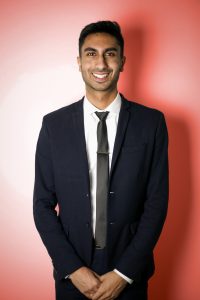
“I definitely have the passion and work ethic to advocate for students on campus.”
In addition to advocating for more scholarships on university committees, Mansoor wants to create five additional SU-funded scholarships for students, which would emphasize holistic traits and leadership experience over academic merit. While his consultation with current vice-president operations and finance Ryan Wallace indicate that this platform point may be more than just lip service, scholarships incur benefit for a limited number of students at a relatively high cost.
Mansoor also wants to expand the SUPER Work program, which provides a wage subsidy for students earning a less-than-competitive wage during the summer to those working in degree-relevant positions. Mansoor wants the existing SUPER Work program to incorporate more research subsidies rather than creating a new fund. Aside from marketing SUPER Work to researchers, he did not clarify how he would go about this.
Mansoor’s most questionable platform point is advocating for the integration of more research-based components in senior courses. This will be difficult to communicate to department heads as it might require extensive re-working of courses. Mansoor also couldn’t correctly identify either the registrar or the U of C’s vice-president research — a cause for concern for a candidate wanting to take on the academic portfolio.
Mansoor also wants to introduce a visual or performatory component to the Undergraduate Research Symposium, which would certainly make the URS more accessible to students undertaking research not conventionally presented on posters. His experience on the URS working group suggests that he is familiar with the issues plaguing the symposium and ways to fix them. Mansoor’s familiarity with current work on Open Educational Resources, as well his intention to increase awareness and aid for students applying for research awards are both timely proposals that would serve students well.
When asked about current vice-president academic Tina Miller, Mansoor said that he valued Miller’s consultation with Student Legislative Council and students on the academic and research plans launched earlier in February. He also recognized that her initial goal of creating an undergraduate research database is a hefty task that likely won’t be accomplished in his year, showing that his expectations for the role are realistic and attainable.
Mansoor’s experience as a science representative and his solid platform make him a safe choice for vice-president academic.
Selected Qualifications:
• SU science representative, 2017–18
• Member of the Undergraduate Research Symposium Working Group, 2017–18
• Faculty of Science Academic Appeals Committee, 2017–18
Jessica Revington
With a well-rounded platform and plenty of poise, Jessica Revington is a strong candidate for vice-president academic. She has a sound understanding of issues within her portfolio and articulates them with confidence.

“I have the confidence to sit down at tables with administrators and make the hard ask when students’ rights and academic needs are at stake.”
A central point of Revington’s platform is that she wants to be easily identifiable for students as the Students’ Union’s VP academic. She plans to do this by meeting with faculty clubs, visiting classes — particularly those which she identifies as especially difficult and ones with swathes of first-year students — and using a D2L shell to send messages directly to students. Each of these communication methods seem reasonable and would be effective in sharing SU resources to help students.
Undergraduate research, and specifically the Undergraduate Research Symposium (URS), comprises another big component of Revington’s platform. She wants to shake-up the URS in a number of ways, the biggest of which would be adding oral presentations to the symposium. It’s a more-than-reasonable proposal that would allow students from more faculties to exhibit their work, given that research symposia at other post-secondaries also often allow the format.
Her other undergrad research proposals aren’t quite as significant, but they are all valuable, achievable ideas. She wants to publish an undergraduate research introduction on the SU’s website, which she argues is more feasible than developing an app or a database, as some past VP academic candidates have proposed. She also mentioned making rubrics for students’ URS abstracts available to them and introducing research workshops.
The standard points that make up a VP academic platform — open educational resources, advocacy for resources like journals and bursaries — are also present in Revington’s platform, but seem more like afterthoughts. That’s hardly a bad thing, as those initiatives have become staples of the VP academic’s portfolio and it’s clear Revington is more concerned with new ideas than paying lip service to things she’d already be expected to do.
Revington’s desire to perform academic outreach is reflective in her platform — it’s clear she wants the role to be active, not passive. She said that she’s spent a long time thinking about the VP academic position, and it shows. She’ll be able to build relationships with both administrators and students that will be valuable in the coming year.
Selected Qualifications:
• SU nursing representative, 2016–2018
• Undergraduate research assistant at the Alberta Children’s Hospital
• Teaching Excellence Awards, Quality Money committee member
Board of Governors
[hr gap=”15″]
The Board of Governors manages the operations of the U of C. The student-at-large representative attends BOG meetings and voices student concerns.
Chinmoy Ayachit
Ayachit’s platform is mainly comprised of unusual promises from a Board of Governors representative candidate. He wants to improve employment prospects for graduates, expand experiential learning opportunities and obtain more scholarships for students. Though Ayachit had some good ideas, like reviving current BOG representative Sam Sirianni’s goal of hosting a meet-and-greet for students with members of the BOG, he did not display a strong grasp of the position and did not elaborate on how he will make these ideas happen or on other logistical aspects of his platform.
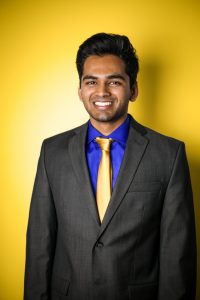
“The university is a testing bed for innovation.”
Ayachit credited his experience founding clubs and serving as the SU engineering faculty representative as reasons for running for the BOG representative position. However, his platform sounds like a vice-president academic platform, though he argues that his proximity to high-level university administrators will help him achieve his goals. Ayachit said the positive feedback he received from students he worked with in the past also influenced his decision to run.
Ayachit noted that his vision of Elizabeth Cannon’s replacement was someone who still “believes in the Energize Eyes High mission” and he seemed hopeful that admin would be following their status quo in his term. For these reasons, it’s unlikely
Ayachit would stand up for students if administration continued to ignore pressing issues in favour of entrepreneurial ventures. This is a problematic stance for either of the two designated student voices on the BOG to take.
He lacked knowledge of how the BOG’s relationship with the provincial government works and what his role would entail. He also stumbled on whether the BOG is responsible to the ministry of advanced education or the general public. According to the Post Secondary Learning Act, BOGs are autonomous as long as they do not overstep their delegated powers. Ayachit also expects to lobby the government alongside other members of the SU executive, though this would be largely an unprecedented step.
Ayachit’s unrealistic platform and lack of research does not warrant confidence in his ability to serve as the BOG representative.
Selected Qualifications:
• SU engineering representative, 2017–18
• President, Chess Club 2015–16
• Internship with an engineering procurement construction management company, 2017–18
Frank Finley
Frank Finley would be a vocal advocate to the Board of Governors, the U of C’s highest decision-making body. The current SU arts representative has a strong understanding of the workings of the university and knows how to influence them, making him a solid choice for the position.
If elected, Finley would begin his term on a board that also includes Elizabeth Cannon, whom he publicly asked to resign in a 2015 Town Hall following the Enbridge controversy. Unafraid to make things awkward, Finley wants to make sure that BOG isn’t just a “rubber stamp” procedure. Though the position is just one vote on a board of 21, Finley claims that to make his voice heard requires being informed, eloquent and bring student concerns forward with strong arguments.
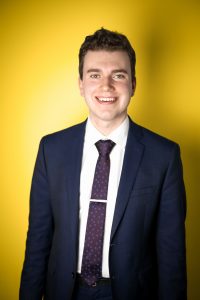
“It is a position that’s been removed from students for a long time and it doesn’t need to be like that.”
The tension would be palpable. But maybe that’s okay.
Finley’s first platform point is to create an advisory committee that consists of representatives from “large and important student organizations on campus.” He said the committee would be contacted through email and would advise him on policy decisions. It would be an admirable effort to get more perspectives into BOG processes, but even Finley admits that student engagement could still be limited. Additionally, what classifies a student organization as important is subject to bias and may foster further indifference in unengaged students compared to the school’s already established ‘involved.’
Still, Finley is correct in claiming that a large part of the student body doesn’t really know what the BOG is. Finley wants to change that by connecting and communicating with more students.
An interesting plan Finley has for the position is to try to get more students to attend board meetings — both as official board members and to observe. Getting more student voices on the BOG has been a recurring platform point for BOG candidates, but unlike those past candidates,
Finley might have found a way in the
Post-Secondary Learning Act that will permit it. He also wants to invite students and politicians to meeting, noting that the tone of discussions can change when people actually come to watch. Whether or not he could use his established network to make this a reality remains to be seen, but the mere presence of more students at meetings could be an extremely effective method to strengthen students’ interests in BOG decisions.
Finley’s past SU experience and his thought-out platform would make him competent for most positions, but it’s his confrontational style and ability to advocate for students that make him a strong candidate for BOG representative.
Selected Qualifications:
•SU arts representative, 2016–18
•Ministerial intern, Ministry of Culture and Tourism and Office of the Premier
•Vice-president external, U of C Debate Society
Mike Moman
Mike Moman is an interesting candidate. Having an extensive background in student politics at the Grande Prairie Regional College, Moman says he will stand up for the interests of U of C students if he is elected as Board of Governors representative. Looking through his resumé, it’s easy to believe him.
Moman served as last year’s Students’ Association president at Grande Prairie Regional College and their vice-president internal the year before. He has also served on that school’s Board of Governors. This experience allows him to know exactly what he is getting into. Moman doesn’t have an agenda for his time on the board, or much of a platform, saying you can’t make promises to students in this kind of position. Instead, he wants to represent students accurately when voting on issues.

“We don’t have the time to have someone who doesn’t have the experience to be sitting in this position.”
Moman claims the most important task he will face is educating students on the purpose of BOG, noting that most students don’t know what the organization does. Moman is well-positioned to pull this off because he has connections with many different groups in the university, such as his announcer position with the Dinos.
Moman feels that, because the university will be appointing a new president and because there will likely be a new chair of BOG, it is vital to have experienced student members sitting on the board. Moman also says he will not just be a ‘yes-man’ and will never have a problem voting contrarily to administration’s interests.
It should be noted that Moman did not seem to know much about the current student representatives on BOG. Following a pause when asked to critique representative Sam Sirianni’s work, Moman said he couldn’t say anything negative about her as everyone does things differently. This demonstrates a lack of knowledge of the current board, but is excusable since it is his first year at the university.
Moman is a compelling speaker who seems to have student interests at heart. Looking at how fast he has connected with different groups in his first year at the University of Calgary and based on his impressive history in student politics, Moman would serve effectively as the student representative position on the Board of Governors.
Selected Qualifications:
•President, Students’ Association of Grande Prairie Regional College, 2016–17
•Vice-president internal, Students’ Association of Grande Prairie Regional College, 2015–16
•Board Member – Grande Prairie Regional College Board of Governors, 2016–17
Endorsements
[hr gap=”15″]
